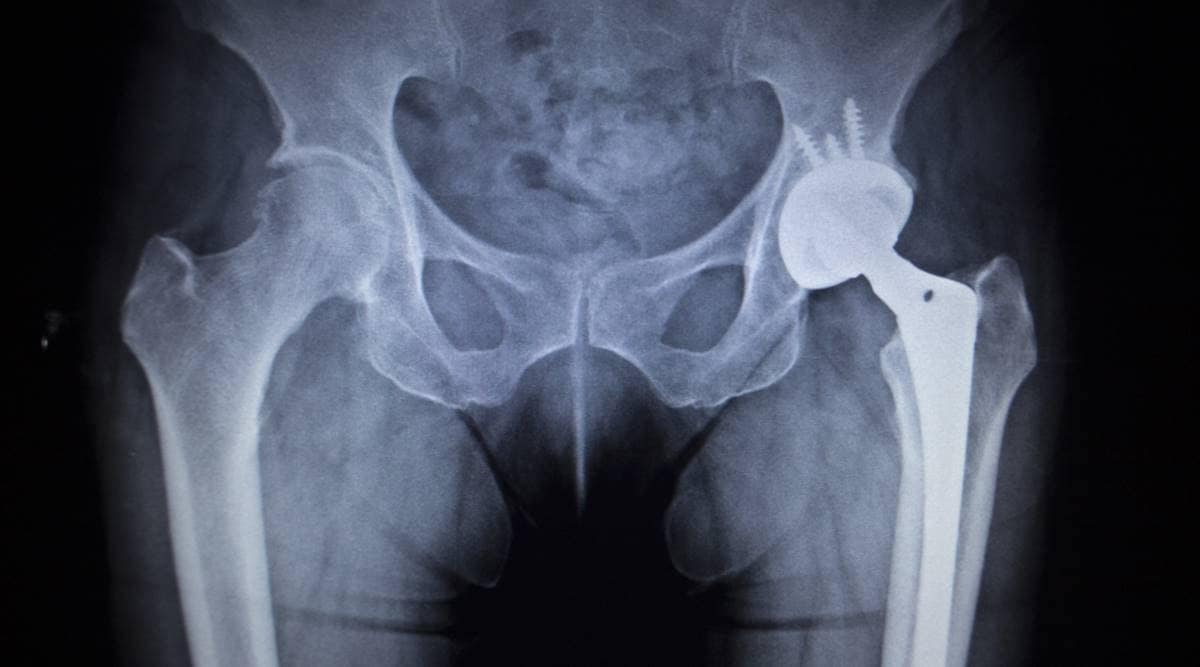📣 For more lifestyle news, click here to join our WhatsApp Channel and also follow us on Instagram
What is avascular necrosis, a post-Covid-19 complication that has ‘astounded the medical community’?
Dr Sarang Deshpande, consultant orthopaedic surgeon, arthroscopy, joint replacement surgeon and sports injury specialist, Wockhardt Hospitals, Mira Road said that Avascular necrosis or death of the bone joint, has "astounded the medical community"
 Prompt diagnosis ensures timely treatment (Source: Getty Images/Thinkstock)
Prompt diagnosis ensures timely treatment (Source: Getty Images/Thinkstock) The multiple Covid-19 waves in India led to many complications in recovered patients, such as mucormycosis, blood clots, new-onset diabetes, and chronic fatigue, among others. The latest condition to get added to this list is Avascular Necrosis (AVN) or osteonecrosis, said Dr Udit Kapoor, consultant, Metro Hospital, Faridabad. This condition is described as the death of the bone tissue when the blood supply doesn’t reach the hip joint, he explained.
Revealing that AVN has “astounded the medical community”, Dr Sarang Deshpande, consultant orthopaedic surgeon, arthroscopy, joint replacement surgeon, and sports injury specialist, Wockhardt Hospitals, Mira Road said that the condition may impact one bone, or multiple bones at the same time “but most frequently affects the ends or joints of long bones, collapsing the surfaces”. In fact, the All India Institute of Medical Sciences (AIIMS) has submitted a proposal to the Indian Council of Medical Research (ICMR) seeking approval for a multicentric study to probe cases of AVN among Covid-19 recovered patients.
What causes avascular necrosis?
While one of the reasons is loss of blood supply, others are mostly due to steroids, alcohol, and sickle cell disease. “Not all patients on steroids will develop AVN as it occurs in only those who are sensitive to certain steroids or those who have a predilection for developing AVN. AVN can also be caused by traumatic events such as a fracture, dislocation of joints, or during cancer treatment due to exposure to radiation. Although the exact reason is still unknown, there is a possible chance that medicines taken during Covid-19 treatment could have reduced blood flow in the body,” Dr Kapoor told indianexpress.com.
 The patient will complain of pain around the hip or the groin region (Source: Getty Images/Thinkstock)
The patient will complain of pain around the hip or the groin region (Source: Getty Images/Thinkstock)
Risk factors for avascular necrosis
– Severe trauma-induced bone damage
– Fractures
– Blood vessels have been harmed
– Long-term corticosteroid usage
– Sickle cell disease
– Pancreatitis or inflammation of the pancreas
– Both radiation and chemotherapy
– Autoimmune conditions
– HIV
– Hyperlipidaemia or high cholesterol where there is an excess of lipids or fats in the blood
Identifying avascular necrosis with symptoms
The patient will complain of pain around the hip or the groin region. It could make it very difficult to walk which could lead to limping, Dr Kapoor mentioned.
Steroid-induced AVN can start occurring anytime from three weeks to three months, said Dr Laxman Jessani, consultant, infectious disease, Apollo Hospitals Navi Mumbai. Dr Deshpande mentioned that while only a few cases of bone mortality have been documented in India so far, “physicians are worried that this number may increase given that it can take between three months and a year for patients recuperating from coronavirus to develop AVN”.
A 2021- BMJ case report also noted that “post Covid-19, there is a greater propensity to develop AVN, mainly if the patient has been on steroids”. “The literature suggests the mean dose of steroid in prednisone equivalents of 2000 mg is required to cause AVN, but we feel that due to the Covid-19 virus, the sensitivity to develop AVN is higher and to a smaller cumulative dose of steroids,” it reads.
Diagnosis and treatment of avascular necrosis
Prompt diagnosis ensures timely treatment. “Hence, periodic MRI scans for possible AVN of the hip in patients with long covid are advised,” Dr Jessani told indianexpress.com.
The diagnosis is made on clinical examination, and finally on an MRI basis by knowing the extent of AVN. Commonly used FICAT And ARLET classifications are the ones used to classify the disease.
“If you diagnose AVN early, it can be treated but if it is diagnosed at a later stage, the person may have to undergo joint replacement surgery. Hence, MRI is very important to identify the disease,” Dr Kapoor said. Agreed Dr Jessani and said that if AVN is left untreated, the hip would be permanently damaged as the disorder is irreversible and would require surgical intervention.
Doctors, when dealing with patients who have long-lasting Covid symptoms, in particular, will advise taking medicine and engaging in physiotherapy for at least six weeks to ease the pain, Dr Deshpande noted. “Patients may need to take anti-inflammatory medications such as statins if they have excessive cholesterol levels and fatty deposits blocking their blood vessels, and blood thinners,” he said.
The sole alternative in cases of the advanced stage is surgery. Core decompression of the bone, bone contouring, bone transplantation, and joint replacement are surgical possibilities. According to Dr Kapoor, the management may involve core decompression to muscle pedicle or hip replacement. Even one contouring and bone transplantation are other surgical possibilities, Dr Deshpande said.
Prevention of avascular necrosis
AVN can be prevented by avoiding spurious medications wherein the probability of steroids mixing is high, Dr Jessani said.
📣 For more lifestyle news, follow us on Instagram | Twitter | Facebook and don’t miss out on the latest updates!
📣 For more lifestyle news, click here to join our WhatsApp Channel and also follow us on Instagram



- 01
- 02
- 03
- 04
- 05
























